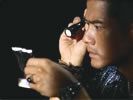Eye For Film >> Movies >> The Detective (2007) Film Review
pot·boil·er n. (informal) a usually inferior work (as of art or literature) produced chiefly for profit
By ending The Detective (or C+ Jing Taam) quite literally with the image of a pot boiling, director/co-writer Oxide Pang seems at pains to signal his film's potboiler status. Indeed at first, with its drab colour palette, low-life milieu and impossibly convoluted plotting, the film might seem an utterly undistinguished hardboiled noir. Even its setting, in a Thai Chinatown, appears designed to evoke the famous neonoir directed by Roman Polanski in 1974.

Yet where a decade ago Hong Kong crime thrillers were all blue filters and balletic gunplay interspersed with either dubious comedy or darkest drama, these days the word 'detective' in a title can promise all manner of generic cross-overs, as was proved by Johnnie To and Wai Ka-Fai's mind-bending morality mystery Mad Detective (2007). Made in the same year, Pang's film turns out to be a similar experiment in hybrid cinematic forms. For If The Detective was shot on the fly between Pang's first two (truly potboiled) forays into Hollywood, The Messengers (2007) and the Bangkok Dangerous remake (2008), then it shares generic features with both of them, combining murderous thrills with something altogether more otherworldly.
As the film begins, desperately broke and myopic detective Chan (Aaron Kwok in engaging form) is visited in his office by casual drinking buddy Lung (Sing Fui-on) who declares, "Someone is following me - someone wants to kill me", and hands Chan a photograph of a smiling woman. "Tell her don't kill me."
Even if Lung is clearly in a state that might generously be described as 'tired and confused', Chan takes the case, both because he needs the money and because he is genuinely intrigued. It is not long before he has discovered both the identity and the address of this mystery woman, but as he tries to track her down in person, his inquiries lead to a trail of fresh corpses. Despite the insistence of his long-time friend Police Inspector Fung Chak (Liu Hai-chi) that the deaths are neither suspicious nor related, Chan is convinced that there must be a connection, and his dogged pursuit of the truth soon makes him both a target himself, and the prime suspect in a case that seems to make less sense the more it progresses.
"It looks like the the whole incident is pre-determined by the unknown Almighty", Chan suggests near the film's close, and in a sense he is right – for The Detective is one of those films where the director himself is a constant invisible presence, subjecting events to endless divine interventions, whether through wild (albeit internally logical) contrivances of the plot, or through bold stylistic flourishes. Much as an unknown hand seems always to be manipulating and directing events from the outside, reflexive touches – Chan's habit of photographing everything he sees, the (fake) gun concealed in an old filmreel canister – abound. A missing person (or several) may provide the film with its narrative frame, but the subject here seems to be the power of recorded images to capture (and bury) truths. In other words, The Detective is concerned with cinema itself.
By the time it is all over, every bizarre detail of this film has been made to fit perfectly together, but the pattern that it follows has up to this point been kept out of reach because the normative confines of genre have made us as short-sighted as the protagonist. The pot boils over, to be sure – but the question of how and why proves to be a mystery not to be investigated by just any old detective.
Reviewed on: 17 May 2009

















